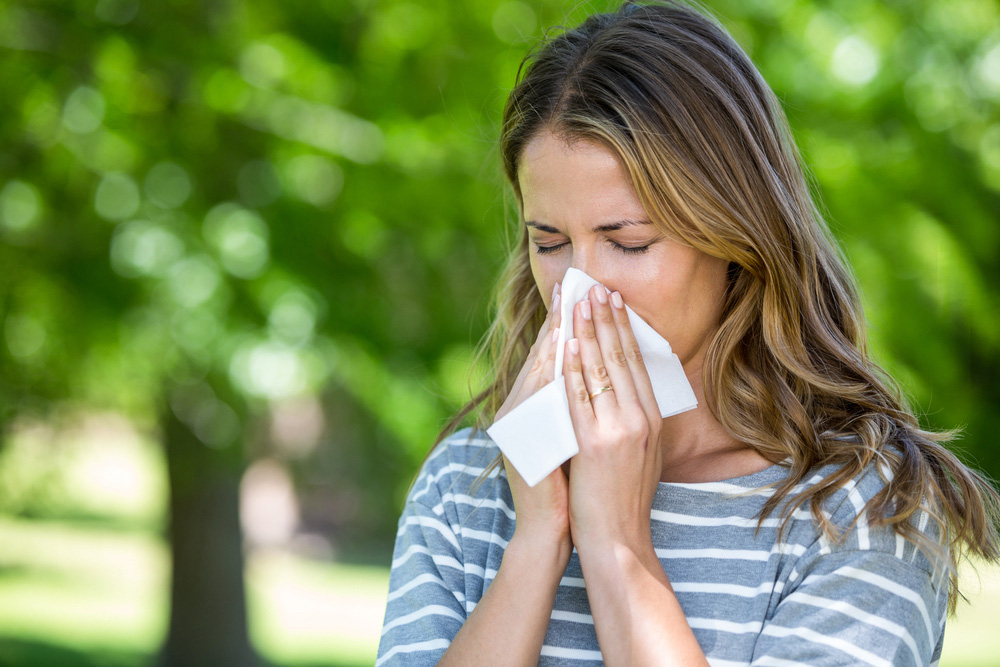
If you’ve got the sniffles, here’s how to figure out what’s causing your ailments.
Just when you think cold and flu season is over, allergy season begins. Your nose starts to run, you can’t stop sneezing, and you generally feel awful. How can you tell if it’s your allergies acting up or if you’re actually sick?
The difference between allergy and cold symptoms
Allergies and colds often have similar symptoms, which can make it difficult to tell them apart.
“Cold symptoms typically include nasal congestion, a sore throat, runny nose and cough,” says Kevin Hur, MD, a rhinology specialist at Keck Medicine of USC. “However, allergy symptoms also include sneezing and watery, itchy eyes — but not fever, wet coughs, body aches or a sore throat.”
Plus, “seasonal allergy symptoms — such as sneezing, itchy and watering eyes and a runny nose — occur when you’re exposed to certain environmental allergens,” says Dr. Hur, an assistant professor of otolaryngology – head and neck surgery at the Keck School of Medicine of USC.
These environmental allergens are typically an issue in the spring, summer and early fall, when trees, grasses and weeds release pollen into the air. The weather affects how much pollen is circulating in the air. And, as temperatures rise, allergens, such as mold, also increase in the air. If you have allergies, and you’re exposed to these substances, your body thinks it needs to fight them, and you start to have symptoms.
Allergy symptoms will last as long as you are exposed to the allergen. On the other hand, cold symptoms generally last about 10 days and may include a cough, fever, chills and sore throat.
How to treat seasonal allergies
“Many treatments for seasonal allergies are safe and accessible without a prescription, including over-the-counter decongestants, antihistamine pills, steroid nasal sprays and sinus irrigations,” Dr. Hur says.
Head off the symptoms of seasonal allergies, by starting your medicine in advance of pollen season for best results. Keep your doors and windows closed on high pollen count days, and if you have air conditioning, use it. If you must go outside, wear a hat and sunglasses to minimize pollen getting into your eyes, then change your clothes when you get inside.
How to treat a cold
Because a cold is a virus, there’s not much you can do to treat it, other than rest and drink plenty of fluids.
“Some ways to treat a cold include drinking plenty of fluids, taking over-the-counter pain relievers, such as Tylenol or Advil, nasal sprays, cough syrups and decongestants,” Dr. Hur says.
Over-the-counter medicines and saltwater sprays won’t cure a cold, but they may help relieve symptoms.
If your symptoms get worse, don’t wait to see a doctor, as you may have a more serious condition. If your throat or lips swell, you experience shortness of breath or have difficulty breathing, seek medical help right away.
If you think you have allergies, get tested.
“If you think you have an allergy, you can get tested with a skin or blood test,” Dr. Hur says.
The allergist will do a blood test and/or prick your skin with different substances that may be allergens and note how your body reacts.
Once your doctor has confirmed the allergy, you may be directed to take antihistamines or be given prescription medication. If you have hay fever (sensitivity to pollen or airborne mold spores), allergy shots may desensitize you to it.
Whether you have a cold or an allergy, knowing which is which will help you treat it appropriately and relieve your symptoms more quickly.
Topics
